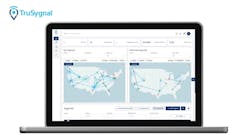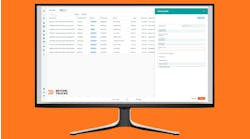Whether it’s caused by demand, economic activity, major political events, weather events, or fuel costs, one of the most significant problems in the trucking industry today for shippers, carriers and freight brokers alike, is rate volatility, according to Lisa McGinty, chief marketing officer at TransVix.
TransVix, which was founded by CEO Craig Fuller in June 2016, was created in an effort to help reduce/eliminate trucking rate volatility. Using a Market Priced Index and Trucking Futures Contracts offered through its Futures Exchange, the company provides trucking industry participants a way to protect against rate volatility and exposure on major U.S. trucking routes.
“We’re trying to de-risk trucking across the board,” Fuller told Fleet Owner. “What we’re creating is an instrument that allows trucking participants to basically offset and hedge themselves against volatile events.”
According to the company, shippers are at risk as rates increase due to higher market demand for capacity caused by known and unknown events (forecasted seasonality, new regulations, strikes, weather and natural disasters, etc.). The TransVix Exchange is set up to help shippers with the ability to lock in rates at current known values using futures contracts that create a "ceiling" on what they will pay for trucking rates in the future through weekly, monthly and/or annual contracts.
Carriers are at risk when they are forced into accepting lower, less desirable pricing through long-term commitment contracts with shippers to try and lock in predictable and recurring business, even with the knowledge that rates will likely rise in their favor in the coming weeks and months, McGinty explained.
“They want to protect against downside rate risk,” she said. “Carriers will benefit from the TransVix Exchange as a way to lock in current rates using futures contracts, while creating a ‘floor’ on what they will receive on trucking rates in the future through weekly, monthly and/or annual contracts.”
Finally, the company noted it can protect freight brokers against upside and/or downside price moves by utilizing futures contracts that lock in rates and give them the ability to protect their margin from adverse price moves.
When it comes to pending regulations – i.e., ELDs and speed limiters – and a new administration coming in, Fuller said TransVix’s goal is to provide consistency and mitigate the inherent volatility that comes along with those types of events.
With the incoming Trump administration, Fuller explained that if the president-elect does bring back a manufacturing base in the U.S. then there will be a higher demand for truckload shipping across the market. However, he said, that will create a lot of wage pressure on the industry and could hurt the availability of drivers as manufacturing jobs might be more appealing to millennials than trucking jobs.
“There are so many things that can happen,” Fuller noted. “It’s hard to know what’s going to happen. We don’t know if all this is good or bad – it’s probably somewhere in between. So what that means is there’ll be volatility. These major political events will create a level of uncertainty and will create the need for people to want to protect themselves.”





